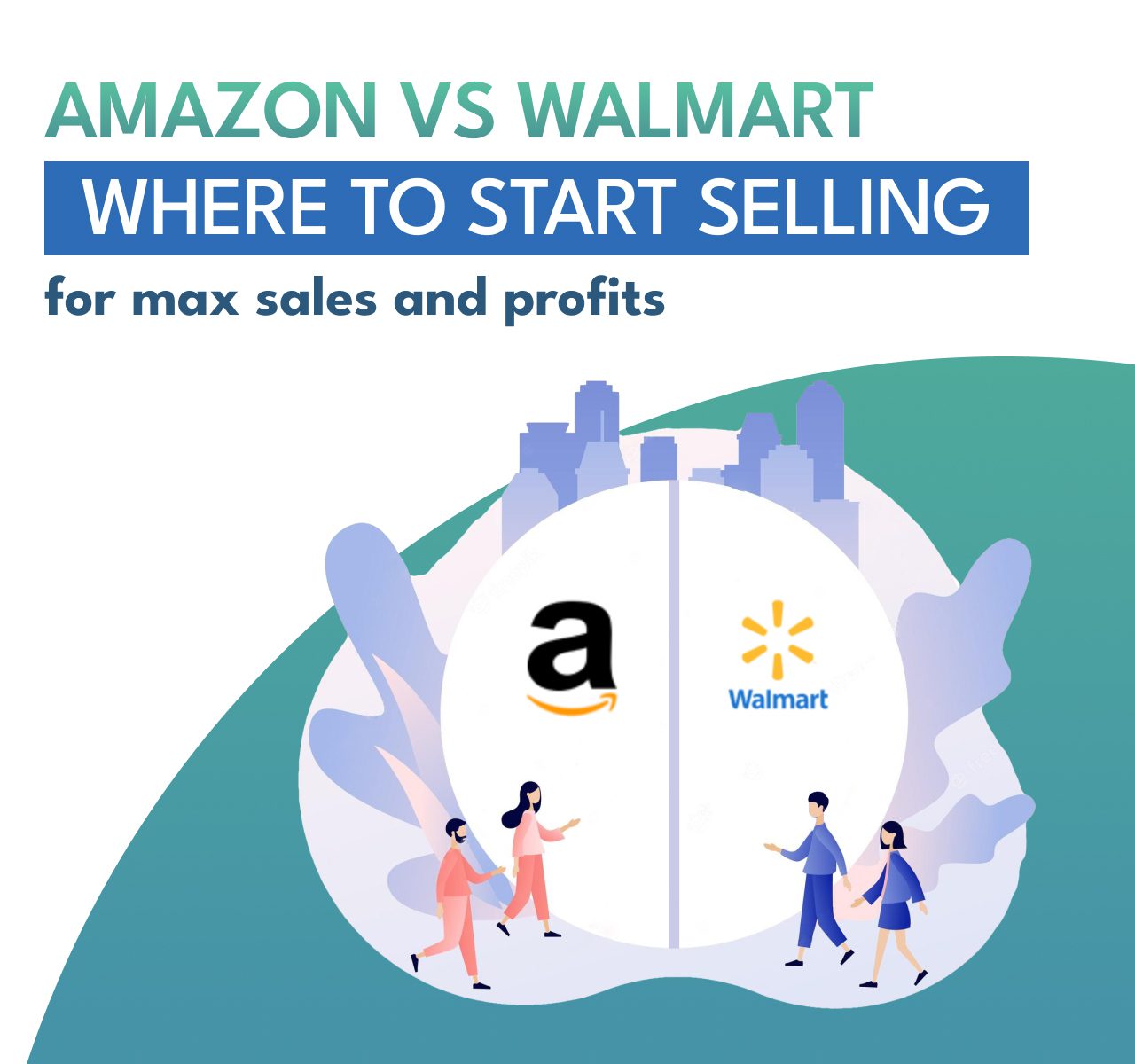
In today’s digital age, e-commerce platforms have revolutionized the way businesses operate. Among the giants of online retail, Amazon and Walmart stand out as frontrunners, offering immense opportunities for online sellers. However, deciding where to begin your selling journey can be a daunting task. This blog aims to compare Amazon and Walmart, focusing on their key features, target audiences, ease of selling and potential for sales and profits. By understanding the nuances of these platforms, you’ll be well equipped to make an informed decision that aligns with your business goals.
Amazon
As the world’s largest online marketplace, Amazon dominates the e-commerce landscape. With a vast customer base and extensive product categories, it provides unparalleled exposure to millions of potential buyers. Amazon’s Fulfilled by Amazon (FBA) program and Prime membership offer convenient shipping options, fostering customer loyalty. Additionally, Amazon’s sophisticated search algorithms and robust advertising tools contribute to increased visibility and conversions.
Walmart
Known for its brick-and-mortar retail presence, Walmart has made significant strides in the e-commerce space. While Walmart’s online marketplace may not match Amazon’s scale, it boasts a loyal customer base and an increasing number of online shoppers. Walmart’s focus on everyday essentials and competitive pricing appeals to budget-conscious buyers. The ability to offer in-store pickup and same-day delivery through its vast network of physical stores is a unique advantage for sellers on the platform.
Amazon vs Walmart: Target Audience and Product Categories
Amazon
Amazon caters to a wide range of customers, spanning various demographics and interests. The platform’s immense product catalog covers virtually every category imaginable, making it suitable for sellers with diverse offerings. Amazon’s customer base consists of frequent online shoppers who value convenience and are willing to explore new products. It is particularly popular among urban dwellers and tech-savvy individuals.
Walmart
Walmart’s target audience primarily consists of budget-conscious shoppers seeking everyday items, including groceries, household essentials, and affordable electronics. While the platform is expanding its product range, it still maintains a focus on core categories that resonate with its customer base. Sellers with products aligned with Walmart’s offerings can tap into a demographic that values affordability and accessibility.
Amazon vs Walmart: Ease of Listing and Selling
Amazon
Listing products on Amazon is generally straightforward, thanks to its user-friendly interface and extensive seller resources. Sellers can create product listings using templates and fill in relevant details such as product title, description, images, and pricing. Amazon offers tools like Bulk Listing and Inventory Management systems, making it efficient for sellers to manage large catalogs. The Fulfilled by Amazon (FBA) program further simplifies selling by handling inventory storage, packaging, and shipping for sellers who opt to use it.
However, due to the sheer size and competitiveness of the Amazon marketplace, gaining visibility can be a challenge. Sellers need to optimize their listings with relevant keywords and employ effective marketing strategies to stand out. Additionally, Amazon’s strict policies and guidelines require sellers to adhere to quality standards and maintain excellent customer service to avoid penalties or suspension.
Walmart
Listing products on Walmart requires sellers to go through an application process and meet specific criteria. While this can make the initial setup slightly more involved, it also contributes to maintaining a reputable seller base and consumer trust. Once approved, sellers can utilize Walmart’s intuitive seller portal to create product listings by providing detailed information, images, and pricing.
Walmart’s interface is user-friendly and allows sellers to manage their inventory, pricing, and promotions efficiently. The platform is actively working on expanding its seller tools, providing features like the Walmart Advertising Partners Program to enhance marketing capabilities. Walmart’s integration with physical stores also allows sellers to offer options like in-store pickup, further enhancing the customer experience.
In terms of competition, while Walmart’s marketplace may be less saturated than Amazon’s, it is important to note that the platform has stringent performance requirements to maintain seller standards. Sellers need to maintain high-quality product listings and meet customer service expectations to thrive on the platform.
Overall, while Amazon offers a more streamlined and comprehensive selling experience, Walmart is catching up with its efforts to provide an intuitive interface and expand seller tools. Sellers should evaluate their specific needs and consider the level of competition and support they require when choosing between the two platforms.
Amazon vs Walmart: Seller Experience and Profitability
Amazon
Amazon’s vast size and global reach translate into immense selling opportunities. The platform’s FBA program allows sellers to outsource inventory management and order fulfillment, streamlining operations. Additionally, Amazon’s reputation and trustworthiness inspire confidence in buyers, leading to higher conversion rates. However, the intense competition on Amazon can make it challenging for new sellers to gain visibility without effective marketing strategies. Pricing pressures and fees associated with selling on Amazon can also impact profitability.
Walmart
While Walmart’s customer base is smaller compared to Amazon, the platform offers advantages for sellers. Walmart’s commitment to low prices and its emphasis on partnering with reputable sellers can boost consumer trust. Additionally, Walmart’s integration of online and offline channels creates unique opportunities, such as in-store pickups and cross-channel promotions. However, the application process for selling on Walmart is more selective, and the platform’s advertising and marketing capabilities are still developing.
Amazon vs Walmart: Sales and Marketing Tools
Amazon
Amazon provides an array of tools and services to help sellers optimize their listings and increase sales. These include sponsored product ads, Amazon Stores for brand customization, and access to detailed analytics. Amazon’s robust search algorithm and personalized recommendations enable sellers to reach potential buyers efficiently. The availability of customer reviews and ratings also plays a crucial role in shaping purchasing decisions.
Walmart
Walmart is gradually expanding its suite of seller tools, but it currently offers a more limited set compared to Amazon. Sellers on Walmart can benefit from sponsored product listings, enhanced content modules, and access to basic analytics. However, the platform’s advertising options are not as comprehensive as Amazon’s, which may impact visibility and promotional capabilities for some sellers.
Concluding thoughts
Choosing between Amazon and Walmart as your selling platform depends on several factors, including your target audience, product range, and desired level of competition. Amazon’s unparalleled reach, vast customer base, and advanced marketing tools make it an attractive choice for sellers aiming for maximum exposure. On the other hand, Walmart’s focus on affordability, loyal customer base, and integration with physical stores can be advantageous for sellers in specific


















